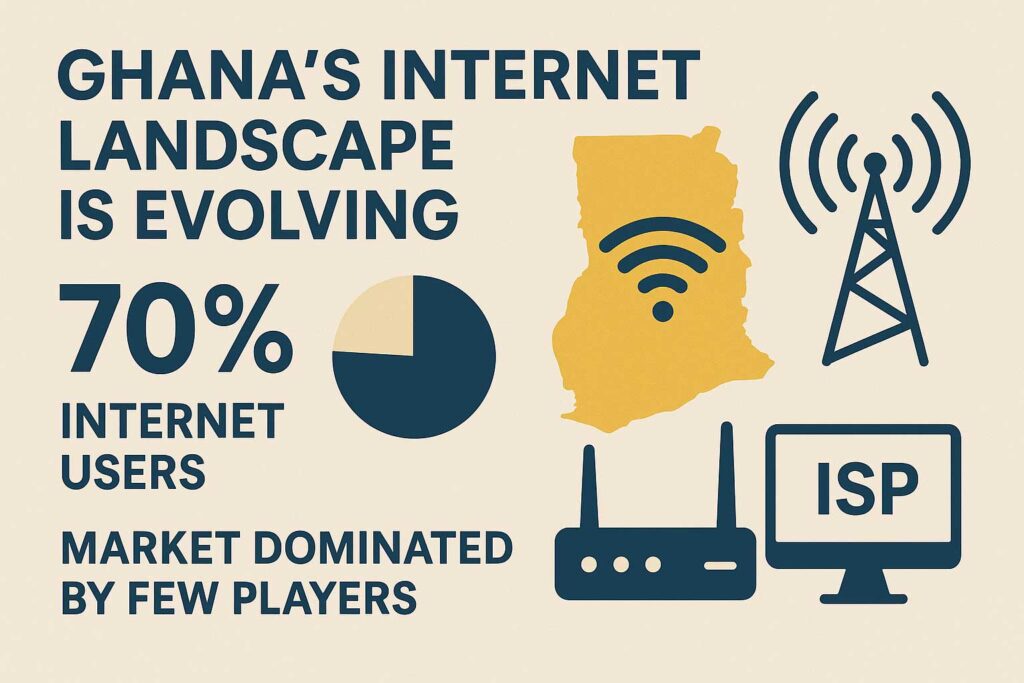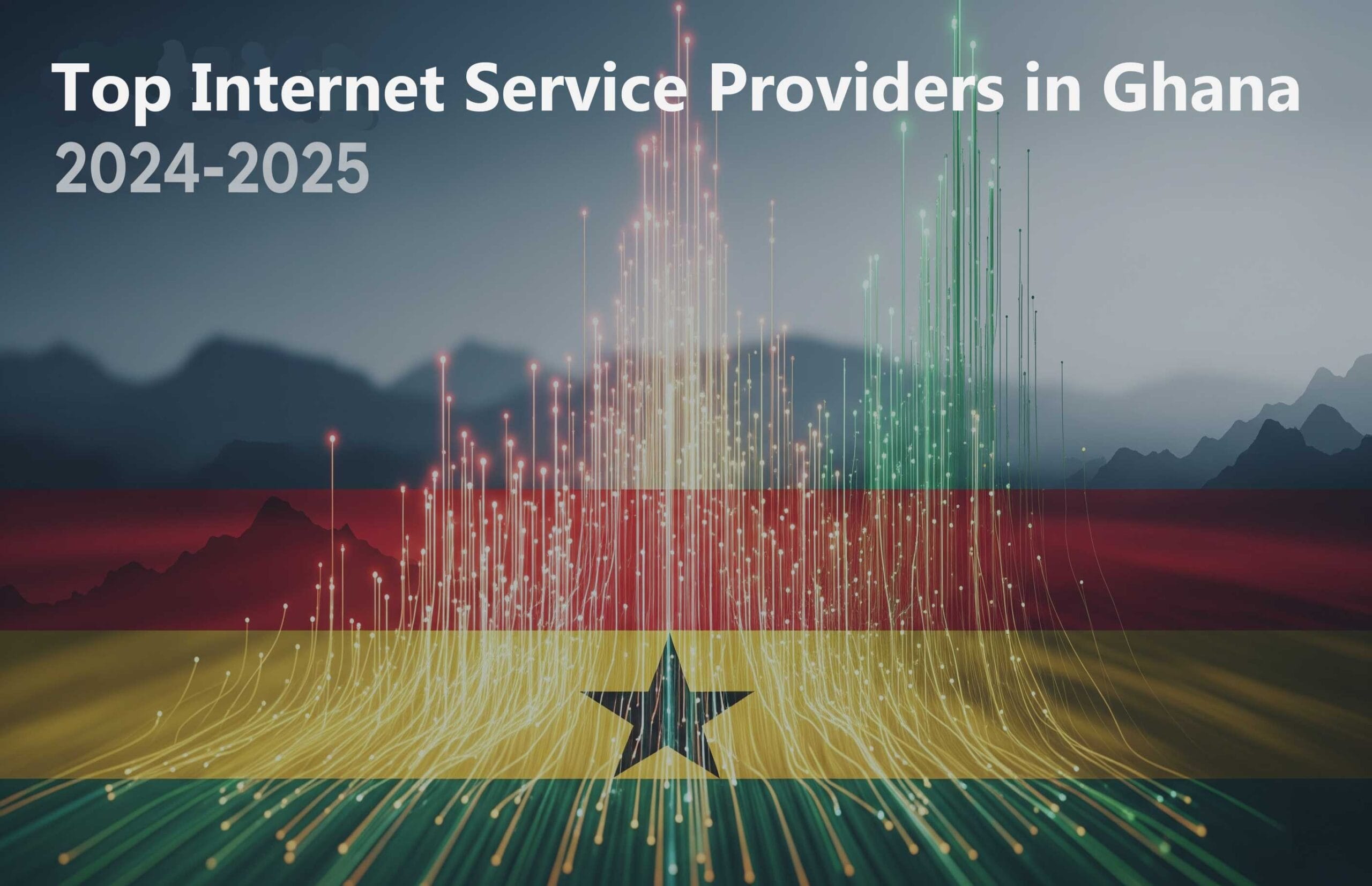Ghana’s internet landscape is evolving rapidly, with a growing number of users and expanding infrastructure. As of 2024–2025, over 70% of the population—about 22.6 million Ghanaians—are internet users. Yet, the market remains heavily dominated by a few players, with one provider holding a commanding lead. This article offers a comprehensive look into the major Internet Service Providers (ISPs) Broadband Technologies in Ghana Providers (ISPs) in Ghana, the technologies they offer, and what consumers and businesses can expect in terms of speed, pricing, and reliability.
Market Landscape: Who Are the Dominant ISPs?
Ghana’s internet market is highly concentrated. MTN Ghana (Scancom Plc) controls approximately 79% of the market, far ahead of competitors. Ghana Telecommunications Company Ltd. (operating Glo) holds around 16%, while Airtel Ghana commands just about 3%. New entrants like Starlink and local providers such as WirelessPlus-3D account for less than 1% combined.
This heavy concentration means that most internet users in Ghana access the web through mobile networks, especially from MTN. Fixed broadband remains limited, with only about 105,800 subscribers nationwide. However, there’s a growing trend toward fiber and fixed wireless access, particularly in urban areas.

Overview of Key Internet Providers in Ghana
1. MTN Ghana (Scancom Plc)
The largest and most established provider in the country. MTN offers extensive nationwide 4G LTE coverage and has aggressively expanded its fiber-to-the-home and fiber-to-business networks. The company operates over 100,000 km of fiber infrastructure globally, making it the top choice for both mobile and fixed broadband.
2. Telecel Ghana (formerly Vodafone Ghana)
Following a rebranding in 2023, Telecel continues to serve as a major mobile operator with 4G services and limited fixed broadband. While its market share is smaller than MTN’s, it remains a key player in both consumer and enterprise markets.
3. Glo Ghana (Ghana Telecommunications Co.)
Offering 3G and 4G mobile data, Glo has a national footprint but a smaller market share, hovering between 10–15%. It focuses primarily on mobile broadband, with competitive data packages.
4. Airtel Ghana (AirtelTigo)
Once a more significant player, Airtel’s market share has dropped to around 3%. It still offers 4G mobile data but struggles with consumer perception and limited infrastructure.
5. Regional and Specialized ISPs
Providers such as Tsunami Broadband, BusyInternet, 3D Wireless Plus, Simba Fiber, and Telenet Ghana operate primarily in major cities like Accra, Kumasi, Takoradi, and Tema. They offer fixed wireless, fiber-optic, and home/office internet packages with varying speed and reliability.
6. Satellite Providers
Starlink, licensed in 2024, is introducing LEO satellite internet. Traditional VSAT providers like YahClick and Eutelsat remain options for remote and enterprise needs, though their adoption is limited due to cost and latency.
Broadband Technologies Available in Ghana
Fiber-Optic Broadband
Fiber is steadily expanding in urban areas. Providers like MTN, Telecel, Simba Fiber, Tsunami, and Telenet offer FTTH and FTTB solutions. Plans typically range from 10 to 100 Mbps, with most offering unlimited data. Prices range from GHC329/month for entry-level plans to over GHC4,600 for high-end business bundles.
Mobile Broadband (4G LTE)
All major providers offer 4G LTE data plans with wide coverage. MTN leads with an average download speed of 15.5 Mbps, followed by Vodafone at 9.3 Mbps and Airtel at 8.9 Mbps. Mobile data remains the primary access point for most Ghanaians.
Fixed Wireless Access (FWA)
ISPs like WirelessPlus-3D use radio links to deliver broadband, mainly in urban centers. Mobile operators also offer LTE-based routers for homes and small businesses.
Satellite Internet
With Starlink entering the market, satellite broadband is expected to expand significantly. Current VSAT options cater to specialized use cases, such as rural businesses or emergency services.
5G and Next-Gen Infrastructure
Although not yet launched for consumers, Ghana is laying the groundwork for 5G. The government’s NGIC project has begun installing 5G-capable sites, with broader rollouts expected by mid-2025. This initiative aims to address gaps in both urban and rural connectivity.
Comparing Residential vs. Business Services
Residential Services
Home users typically choose between prepaid mobile bundles or unlimited fiber packages. For example, Simba Fiber offers 15–35 Mbps plans for GHC400–740 per month. Mobile data bundles are available from GHC5–20 for 1–5 GB, depending on the provider and promotions.
Business Services
Businesses prioritize speed, reliability, and service-level agreements. MTN and Telecel offer high-speed fiber plans (10–100+ Mbps) bundled with static IPs and 24/7 support. Prices range from GHC754 to GHC4,600+ per month. Dedicated wireless and point-to-point connections are also available for corporate clients with branch networks.
Urban vs. Rural Access
Urban centers have better access to fiber and high-speed fixed broadband. In contrast, rural regions largely depend on mobile networks or satellite, with efforts underway to bridge the digital divide through government programs and international funding.
Sample Pricing Plans (Unlimited Data)
| Provider | Speed | Monthly Price (GHC) | Type |
|---|---|---|---|
| MTN (Business) | 10 Mbps | 754 | Fiber (business) |
| MTN (Business) | 60 Mbps | 4,634 | Fiber (business) |
| Simba Fiber | 15 Mbps | 400 | Fiber (residential) |
| Simba Fiber | 35 Mbps | 740 | Fiber (residential) |
| Telenet Ghana | 10 Mbps | 329 | Fiber (residential) |
| Telenet Ghana | 25 Mbps | 729 | Fiber (residential) |
Note: All plans listed above are for unlimited data. Prices may vary depending on location and promotional offers.
Performance and Reliability
Speed
According to recent tests, Ghana’s median fixed broadband speed stands at about 50 Mbps. MTN’s 4G mobile service offers the best mobile speeds, with average downloads at 15.5 Mbps.
Latency
Latency is generally acceptable for real-time applications, with MTN and Vodafone delivering around 46–47 ms. Fiber connections perform even better, often staying below 20 ms.
Reliability
Urban networks are reasonably stable, but rural users face challenges due to limited infrastructure and frequent power outages. National outages caused by undersea cable damage highlight the system’s fragility.
Customer Support
While major providers offer 24/7 support, user experiences vary. Some regional ISPs receive praise for responsiveness, while others are frequently criticized for slow resolution of issues and billing problems.
Challenges in Ghana’s Internet Sector
- Market Monopoly: MTN’s dominance suppresses competition, which can affect pricing and innovation.
- Infrastructure Gaps: Rural and underserved areas still lack reliable broadband.
- Service Quality: Inconsistent speeds, occasional outages, and varying customer support standards impact user satisfaction.
- 5G Delays: While infrastructure is underway, consumer access to 5G remains a future promise.
Conclusion
Ghana’s internet sector is marked by significant growth and innovation, especially in urban centers where fiber and LTE are readily available. However, challenges like limited competition and rural connectivity persist. MTN continues to dominate the market, offering both the widest coverage and the fastest speeds. Yet, the entry of new players like Starlink and the rollout of 5G infrastructure may shift the dynamics in the near future. For consumers and businesses alike, understanding the strengths and limitations of each provider is key to making informed choices in this evolving digital landscape.





